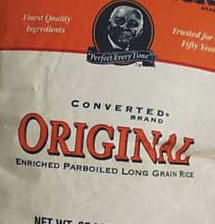Parboiling is an age-old process in parts of Asia, Africa, and to a limited
extent in some European countries and America. This process improves the
milling recovery of paddy rice, salvages poor quality or spoiled paddy
rice, and meets the demands of certain consumers. Many of the larger food
processing manufacturers parboil rice before it is processed.
 |
| Many of the larger food processing manufactures parboil rice before it is processed. |
Some research studies report that parboiled rice retains more protein, vitamins, and minerals and is more nutritious than raw milled rice. However, other studies show no significant nutritional difference between the two. The inconsistency in results may be due to the method of parboiling, condition of the paddy, degree of bran removal, and variety differences which have more effect on the nutritional value.
Regardless of the advantages or disadvantages, consumer preferences in
some countries require parboiled rice.